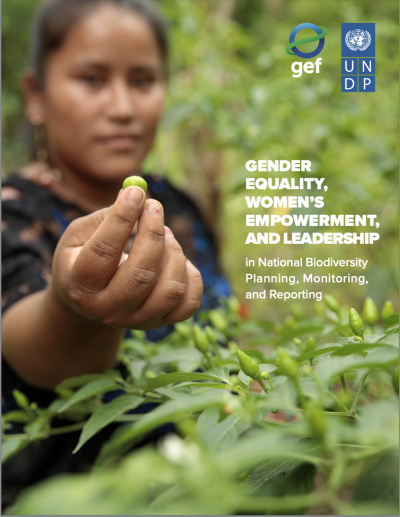
- Report year:2024
- Report author: Christina Supples, Marion Marigo, Lea Phillips, Verónica Recondo, Prudence Raine, and Alexis Legigand
- Organisation: United Nations Development Programme
Promoting opportunities for gender equity, women’s empowerment, and leadership during national biodiversity planning, monitoring, and reporting, such as towards the Kunming-Montreal Global Biodiversity Framework, helps to ensure an inclusive and equitable approach to biodiversity conservation for the benefit of present and future generations. However, biodiversity policies are often created without women’s input or leadership, resulting in policies that may not as effectively respond to their needs or account for women’s knowledge and experience.
This publication provides seven entry points for mainstreaming gender into planning, monitoring, and reporting for revised or updated National Biodiversity Strategies and Action Plans (NBSAPs) that are aligned with the Kunming-Montreal Global Biodiversity Framework. Case studies illuminate how these entry points can also be applied at the local and regional level, for gender-responsive small-scale conservation and sustainable development projects. The publication also seeks to shed light on trends in the capacities of countries to mainstream gender during the development of national biodiversity reporting systems related to CBD, based on an assessment of gender in Sixth National Reports to the CBD from more than 60 Parties. These findings can help guide national-level actions towards pursuing gender equality in biodiversity planning, monitoring, and reporting.
This publication provides seven entry points for mainstreaming gender into planning, monitoring, and reporting for revised or updated National Biodiversity Strategies and Action Plans (NBSAPs) that are aligned with the Kunming-Montreal Global Biodiversity Framework. Case studies illuminate how these entry points can also be applied at the local and regional level, for gender-responsive small-scale conservation and sustainable development projects. The publication also seeks to shed light on trends in the capacities of countries to mainstream gender during the development of national biodiversity reporting systems related to CBD, based on an assessment of gender in Sixth National Reports to the CBD from more than 60 Parties. These findings can help guide national-level actions towards pursuing gender equality in biodiversity planning, monitoring, and reporting.
